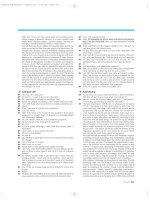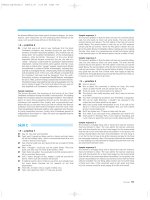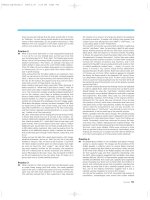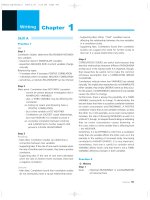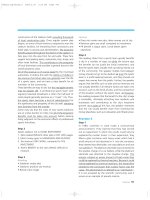Tài liệu Mastering skills for the toefl ibt part 7 pdf
Bạn đang xem bản rút gọn của tài liệu. Xem và tải ngay bản đầy đủ của tài liệu tại đây (452.12 KB, 10 trang )
Answer Key
753
Skill E
01
1. (D) 2. (C) 3. (C)
4. The passage states that Hemingway is most
well-known for his novels, not his non-fiction
pieces. Therefore, the answer is (C).
02
1. (C) 2. (B) 3. (A)
4. The passage states that the former, which refers to
nodding, is communicated in Turkey by raising the
eyebrows. Thus, someone in Turkey would not
understand a nod from a person of another culture,
so the answer is (B).
03
1. (B) 2. (C) 3. (A)
4. One night, a spirit wearing the jingle dress appeared
to him in a dream. A spirit is a supernatural being and
the Ojibwa man believed in it. Thus, the answer is
(C).
Skill F
01
1. Native --- (C), (D), (G); Non-native --- (A), (E)
2. (A) 3. (A)
4. Neither (B) nor (F) is mentioned in the passage.
02
1. (A), (B), (D)
2. (B) 3. (A)
4. Sentences 2 and 3
03
1. Slang --- (A), (C), (G);
Mainstream Speech --- (D), (E), (H)
2. (B) 3. (C)
4. Neither (B) nor (F) is mentioned in the passage.
Review A-F
Vocabulary Review
1. (D) 2. (C) 3. (B)
4. (D) 5. (D) 6. (C)
7. (D) 8. (A) 9. (D)
10. (A) 11. (D) 12. (C)
13. (C) 14. (A) 15. (C)
16. inability 17. distinguish 18. composing
19. contend 20. recite 21. perish
22. access 23. perish 24. proficient
25. preclude
Skill Review
01
1. (C) 2. (A) 3. (A)
4. (D) 5. (A) 6. (C)
7. (B) 8. (A) 9. (C)
10. (A) 11. (C)
12. Inflow --- (B), (D), (H); Outflow --- (A), (E), (F)
02
1. (B) 2. (D) 3. (A)
4. (B) 5. (C) 6. (A)
7. (D) 8. (B) 9. (A)
10. (B) 11. (A)
12. (B), (E), (F)
Mastering-Books_5 2006.5.29 2:13 PM Page 753
754
Answer Key
Skill A
01
1. (A) 2. (C) 3. (A)
4. (A)
5. England --- (C), (E), (F), (G); France --- (B), (D), (H)
02
1. (C) 2. (B) 3. (A)
4. (D)
5. Bit --- (B), (G); Byte --- (A), (C), (D)
03
1. (D) 2. (A) 3. (B)
4. (C) 5. (A), (E), (F)
04
1. (D) 2. (D) 3. (B)
4. (D)
5. Fear --- (B), (C); Anxiety --- (D), (E), (G)
05
1. (D) 2. (D) 3. (D)
4. (B) 5. (B), (C), (D)
Skill B
01
1. (B) 2. (C) 3. (D)
4. (C)
5. Flock in Florida --- (D), (E);
Flock in Texas --- (B), (C), (G)
02
1. (C) 2. (A) 3. (D)
4. (B) 5. (B), (D), (F)
03
1. (D) 2. (A) 3. (A)
4. (B)
5. Early jazz musicians --- (C), (F), (G);
Armstrong’s innovations --- (B), (D)
04
1. (B) 2. (C) 3. (D)
4. (B) 5. (A), (C), (E)
05
1. (C) 2. (A) 3. (D)
4. (C)
5. Ideas Before 1300 --- (C), (G);
Ideas After 1300 --- (A), (B), (D)
Skill C
01
1. (D) 2. (C) 3. (B)
4. (B) 5. (A), (B), (C)
02
1. (D) 2. (B) 3. (B)
4. (C)
5. Herbs --- (C), (D), (E), (H); Spices --- (F), (G), (I)
03
1. (D) 2. (C) 3. (A)
4. (D) 5. (A), (D), (F)
04
1. (B) 2. (D) 3. (C)
4. (A) 5. (A), (B), (E)
05
1. (D) 2. (A) 3. (C)
4. (B) 5. (A), (C), (F)
Review A-C
Vocabulary Review
1. (B) 2. (C) 3. (A)
4. (C) 5. (A) 6. (D)
7. (B) 8. (B) 9. (D)
10. (B) 11. (C) 12. (A)
13. (D) 14. (A) 15. (A)
16. (C) 17. (D) 18. (C)
19. (A) 20. (B) 21. (C)
Chapter
2
Mastering-Books_5 2006.5.29 2:13 PM Page 754
Answer Key
755
22. (A) 23. (B) 24. (A)
25. (D) 26. (B) 27. (D)
28. (B) 29. (C) 30. (C)
31. immigration 32. likelihood 33. occupation
34. social security 35. comprised 36. exposed
37. link 38. enables 39. misery
40. ensures 41. motivation 42. cite
43. descend 44. innovative 45. exclusively
46. (E) 47. (A) 48. (D)
49. (B) 50. (C)
Skill Review
01
1. (D) 2. (C) 3. (C)
4. (C) 5. (B) 6. (B)
7. (D) 8. (C) 9. (C)
10. Causes of Isolation --- (E), (H);
Effects of Isolation --- (C), (D);
Ways to Prevent Isolation --- (A), (F)
02
1. (B) 2. (B) 3. (D)
4. (B) 5. (A) 6. (C)
7. (D) 8. (A) 9. (A)
10. (B), (D), (F)
Skill D
01
1. (D) 2. (B) 3. (D)
4. (A) 5. (A), (D), (E)
02
1. (D) 2. (D) 3. (A)
4. (C) 5. (A), (C), (F)
03
1. (A) 2. (D) 3. (C)
4. (B)
5. Traditional --- (B), (E), (F); Non-traditional --- (A), (C)
04
1. (B) 2. (C) 3. (C)
4. (A) 5. (A), (C), (E)
05
1. (C) 2. (C) 3. (D)
4. (B)
5. Classical Realism --- (A), (D), (F);
Romantic Realism --- (B), (C)
Skill E
01
1. (C) 2. (D) 3. (B)
4. (C) 5. (A), (C), (F)
02
1. (B) 2. (A) 3. (D)
4. (B) 5. (A), (D), (E)
03
1. (B) 2. (C) 3. (C)
4. (B)
5. Imports --- (B), (C), (G) Exports --- (A), (D)
04
1. (A) 2. (C) 3. (C)
4. (B) 5. (A), (D), (E)
05
1. (A) 2. (B) 3. (B)
4. (D) 5. (B), (D), (F)
Skill F
01
1. (D) 2. (D) 3. (A)
4. (C) 5. (A), (C), (F)
02
1. (C) 2. (C) 3. (A)
4. (B)
5. Agents of Socialization --- (A), (F), (H)
Types of Socialization --- (B), (C), (G)
03
1. (B) 2. (B) 3. (B)
4. (C) 5. (B), (C), (E)
Mastering-Books_5 2006.5.29 2:13 PM Page 755
756
Answer Key
04
1. (B) 2. (A) 3. (D)
4. (A)
5. Moving Plates --- (B), (C), (E)
Forming Mountains --- (A), (G)
05
1. (A) 2. (B) 3. (C)
4. (C) 5. (B), (C), (E)
Review A-F
Vocabulary Review
1. (B) 2. (C) 3. (D)
4. (B) 5. (A) 6. (C)
7. (A) 8. (A) 9. (D)
10. (B) 11. (B) 12. (D)
13. (A) 14. (B) 15. (A)
16. (C) 17. (C) 18. (D)
19. (A) 20. (B) 21. (A)
22. (D) 23. (B) 24. (C)
25. (A) 26. (D) 27. (B)
28. (A) 29. (C) 30. (A)
31. advent 32. evolution 33. discredit
34. essence 35. Inevitably 36. interpret
37. diverse 38. adaptation 39. diverge
40. retain 41. obscurity 42. mechanical
43. prophetic 44. reverence 45. uniformity
46. (C) 47. (E) 48. (A)
49. (D) 50. (B)
Skill Review
01
1. (B) 2. (D) 3. (B)
4. (B) 5. (D) 6. (D)
7. (C) 8. (D) 9. (A)
10. (B) 11. (D)
12. Intensity --- (A), (E), (G); Spread --- (C), (D), (H)
02
1. (B) 2. (D) 3. (C)
4. (B) 5. (A) 6. (A)
7. (C) 8. (B) 9. (D)
10. (C) 11. (C)
12. (B), (C), (F)
Mastering-Books_5 2006.5.29 2:13 PM Page 756
Answer Key
757
Focus A
Guided Practice
01 Acupuncture
Suggested underlined sentences:
In China, the practice of acupuncture has been traced
back to approximately the 1
st
millennium B.C.
Acupuncture is understood to be a procedure for regulating
the circulation of gi (vital energy) and blood.
Traditional Chinese medicine is not based on knowledge
of modern physiology, biochemistry, nutrition, anatomy,
or any of the known mechanisms of healing.
Though it has continued to be regarded with some
level of skepticism and mistrust, acupuncture is gradually
becoming accepted in the Western world as a form of
medicine.
Summary
Suggested answer:
The technique of acupuncture has been used in China to
help people recover from illness for at least 2,000 years.
Acupuncture was originally used to control the flow of
vital energy, called gi, and blood through the body.
Because it is not founded in knowledge gained from
modern health sciences, many medical experts in the
western world do not accept the benefits of acupuncture.
Despite this skepticism, more and more people are
turning to acupuncture as a form of medicine.
02 Capitalism
Suggested underlined sentences:
Social stratification is the hierarchical arrangement of a
society into social classes and strata that are very difficult
for individuals to rise through.
By and large, individuals are locked into a socio-economic
class from birth and are kept there by social limitations.
A key tenet of social stratification is that status is inherited.
The group can be defined by wealth and social status,
but it is often also related to such factors as race, ethnicity,
gender, age, and religion.
Summary
Suggested answer:
Social stratification is the hierarchical arrangement of a
society into social classes and strata that are very difficult
for individuals to rise through. One critical factor related
to social class is that children can inherit this class from
their parents. Additionally, those born into the higher
strata of society use their power to maintain their wealth
and position in society. Other birth factors that may
determine a person’s social class include the person’s
race, ethnicity, and gender.
Self Practice
01 Parts of Plot
Suggested underlined sentences:
Aristotle, in his Poetics, looks at the form of tragedy in
drama.
By this, Aristotle indicates that the medium of tragedy
is not narrative, but drama.
To be whole, the tragedy must have a beginning, middle,
and an end.
The aim of the play is to bring out this catharsis within
the audience.
Summary
Suggested answer:
In Poetics, Aristotle outlines the critical features of a
tragedy. First, Aristotle claimed that tragedy should be
shown rather than told. A tragedy must also have a
logically connected beginning, middle, and end.
Additionally, Aristotle believed that a tragedy should
lead the audience to a catharsis.
02 Management
Suggested underlined sentences:
Several studies have identified key mistakes that can
impede a talented manager’s career.
The first key mistake is insensitivity.
Another somewhat related common flaw is arrogance.
Betrayal of trust is cited in the studies as a third common
mistake.
Chapter
3
Mastering-Books_5 2006.5.29 2:13 PM Page 757



